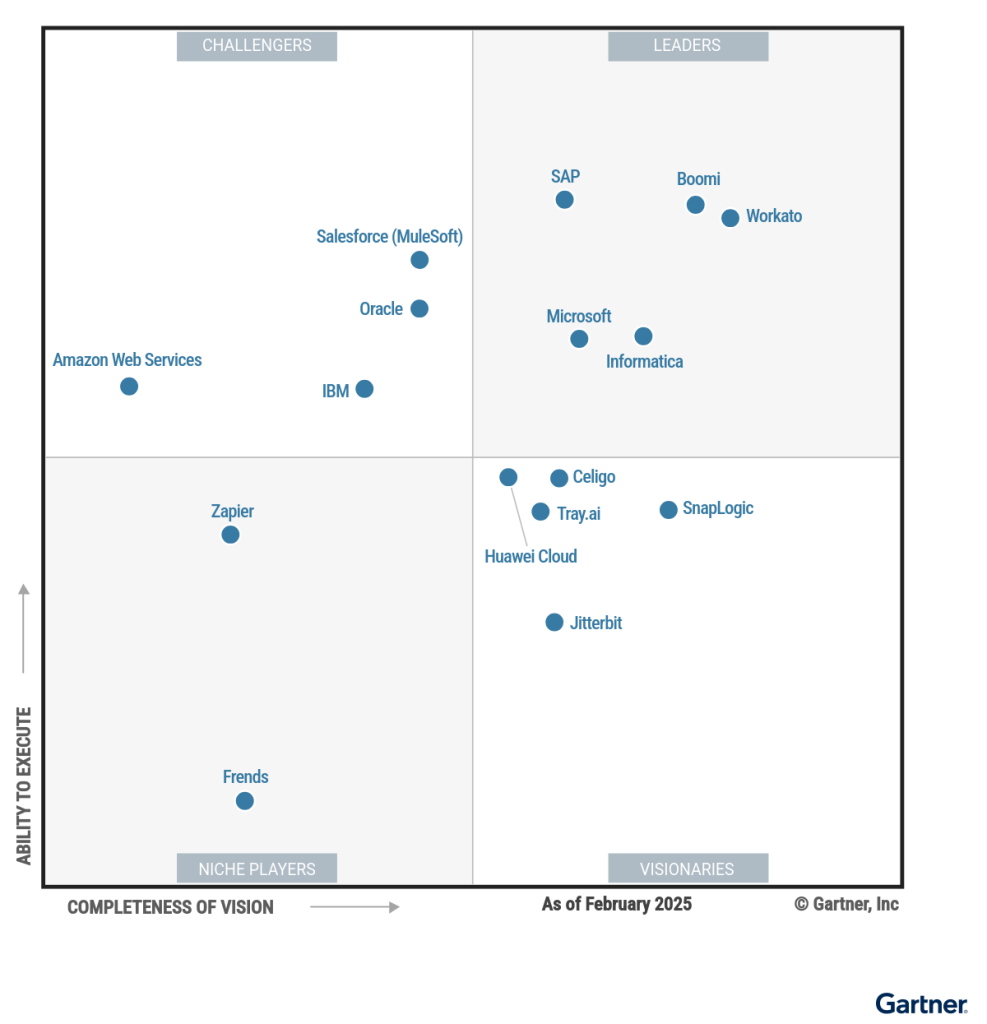In its latest Magic Quadrant™ report for Integration Platform as a Service (iPaaS), Gartner has named Microsoft a Leader for the seventh consecutive year. This recognition affirms Azure Integration Services’ strong position in the integration landscape and highlights the growing value of Azure Integration Services as a comprehensive, scalable, and intelligent integration platform.
As organizations worldwide face increasing pressure to modernize applications, integrate diverse systems, and enable AI-driven automation, Microsoft stands out by delivering a holistic and developer-friendly integration suite. Let’s explore what makes Azure Integration Services the preferred iPaaS for enterprises and how it compares to other leading solutions.
Azure Integration Services: Unified, Scalable, Intelligent
Azure Integration Services is a cohesive set of cloud-native tools that enable enterprises to connect applications, data, and services seamlessly. The core components include:
- Azure Logic Apps — Low-code orchestration and workflow automation
- Azure API Management — Secure and scalable API publishing and lifecycle management
- Azure Service Bus — Enterprise-grade message brokering with support for complex messaging patterns
- Azure Event Grid — Event-driven architecture to power real-time integrations
- Azure Functions — Serverless compute to extend integrations with custom code
- Azure Data Factory — Hybrid ETL for data integration at scale
Together, these tools empower developers and architects to design complex integration flows with ease, whether operating entirely in the cloud or in hybrid environments.
Why Microsoft is a Leader in iPaaS
1. AI-First Integration Strategy
Microsoft has embraced AI not just as an add-on but as a core capability of its integration suite. With connectors for Azure OpenAI, Azure AI Search, Document Intelligence, and Cognitive Services, enterprises can embed AI-powered decisions and content extraction into their workflows.
Notably, Azure API Management now supports the GenAI Gateway, providing robust governance and observability for generative AI APIs—a feature that resonates with organizations seeking control over LLM usage across departments.
2. Comprehensive Hybrid Integration Capabilities
Azure offers robust hybrid integration options through on-premises data gateways, custom connectors, and BizTalk migration tooling. Whether migrating legacy workloads or bridging cloud-native and traditional applications, Microsoft supports incremental modernization without business disruption.
Customer Example:
- Visa: Migrated legacy HR systems using Logic Apps, reducing maintenance overhead by 95% and improving developer productivity by 30%.
- Brisbane City Council: Replaced a 15-year-old system, improving data sync times from over an hour to just five minutes.
3. Global Reach and Enterprise-Grade Infrastructure
With availability in over 70 Azure regions, Microsoft delivers unmatched scale, performance, and compliance. Enterprise customers benefit from tiered SLAs, role-based access control (RBAC), and fine-grained monitoring.
This global footprint makes Azure a preferred platform for multinational organizations needing integration that respects data sovereignty, latency, and reliability requirements.
4. Developer Productivity and Extensibility
Azure Integration Services caters to both citizen developers and professional engineers:
- Drag-and-drop design tools (Logic Apps Designer)
- CI/CD pipelines and DevOps support (via Azure DevOps or GitHub Actions)
- Built-in versioning, rollback, and diagnostics
This hybrid low-code + pro-code approach ensures that businesses don’t have to choose between agility and control.
5. Pay-as-You-Go and Licensing Flexibility
Azure’s consumption-based pricing offers transparency and cost control, with options to scale horizontally without upfront licensing costs. This flexibility is ideal for businesses with fluctuating integration volumes or experimental AI workloads.
Azure vs. Other iPaaS Solutions
| Capability | Azure Integration Services | Other iPaaS Vendors (e.g., Boomi, MuleSoft, Informatica) |
|---|---|---|
| Toolset Breadth | API, workflow, messaging, events, AI, ETL | Varies (often limited to 2-3 pillars) |
| AI Integration | Native support for Azure AI + OpenAI | Limited or via third-party connectors |
| Hybrid & Legacy Support | First-class hybrid tools, BizTalk migration | May require additional adapters or bridges |
| Developer Experience | Low-code + full-code extensibility | Often focused on either low-code or API only |
| Global Availability | 70+ regions, compliance-ready | More limited global footprint |
| Pricing Model | Usage-based, no license lock-in | Often license-based or fixed-tier plans |
Final Thoughts
Microsoft’s position as a Leader in the 2025 Gartner Magic Quadrant for iPaaS is a testament to its long-term commitment to innovation, customer success, and intelligent cloud services. Azure Integration Services empowers organizations to:
- Modernize legacy platforms without disruption
- Automate business processes using AI
- Integrate applications across cloud, on-premises, and edge
- Achieve compliance and performance at global scale
As cloud-native, AI-driven architectures become the new standard, Azure Integration Services provides the flexible, future-ready foundation that enterprises need to thrive.


